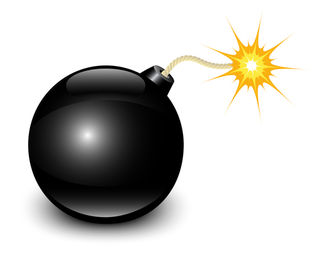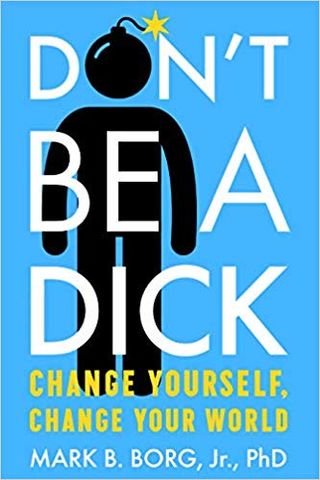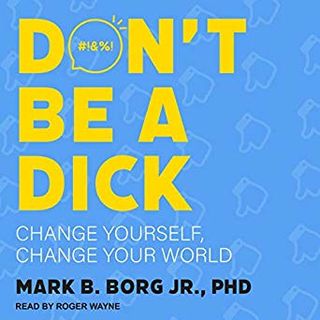Anger
"Don’t Be A Dick!"
Irrelationship Group's Dr. Mark B Borg Jr talks about how he learned to stop
Posted October 31, 2019 Reviewed by Hara Estroff Marano

At 5:00 AM on a Monday morning, I received what felt like an accusatory text-message from a colleague. My immediate reaction was to fantasize about ways to shred my relationship with this person—a relationship I’d been painstakingly building for almost ten years—by firing back the nastiest response I could pack into a text message. Fortunately, I was so agitated that I was unable to formulate as potent a counterpunch as I imagined firing back, so the fantasy went unrealized.
What had happened? I immediately came out swinging; or, put another way, I instantly turned into a dick.
What, exactly, do we mean when we say somebody’s being a dick?
The Urban dictionary defines it this way:
To be brash and insensitive to another, to put your own interests above all else—to act like a penis.
Also (as a definition of “dickish”):
Spouting or discharging grossly without thinking!

Don't Be A Dick is the mantra I try to remember to repeat to myself while walking to my office on the irritable, irritating, and often, unforgiving, streets of New York. Only, it isn’t just a mantra: it’s a life-saver.
It's also the title of my new book, and it grew out of a summer jammed with conflict related to a writing project I’d been sharing for several years with two of my colleagues (“the Irrelationship Group”), although the book isn’t part of that project. It’s the fruit of a sorely needed pause I took from it—a pause that enabled me to appropriate space and calm so I could figure out some non-destructive ways to respond to recurrent issues plaguing the Irrelationship Group, issues that nearly derailed the project at the very time the group was doing some of its most productive work.
As a psychoanalyst and academic in clinical practice, I can say with confidence that the literature doesn’t provide a definition for dick; nor does the Diagnostic & Statistical Manual offer a list of symptoms or behaviors for clinicians to use to arrive at a diagnosis. But if my 20+ years in clinical practice is any indication, being a dick is widespread. In fact, a large percentage of the problems I see socially, politically, and clinically happen when we are either: dicks, victims of dicks, or (most commonly) some combination of the two—often cyclically.
If you’re tempted to assume that being a dick is endemic to big cities, I can assure readers that a large swath of people I treat sustained the effects of the dick issue long before they lived in New York.
Everybody carries around unexpressed anger, and most of us probably tell ourselves over and over that the things that piss us off are somebody else’s fault. The problem with setting the issue up that way is that it relies on some kind of idea that the world is supposed to be fair—and fair in the way that I think fairness should look. Then, when the world doesn’t live up to my particular idea of fair, that justifies my acting like a dick. This, in turn, is going to make me somebody else’s target when she or he is acting like a dick—that is, when they’re venting their unexpressed anger. All of this, of course, could be short-circuited if I—if we—found a better way to do something about pent up anger.

Being a dick is also closely related to holding tightly to the idea that I’m always right. In this case, anytime somebody disagrees with me, that’s going to read to me as an attack. In reality, however, insisting that I’m always right is a backhanded way of putting everybody else down. Sooner or later, this is going to make others treat me to a raised middle finger, which I will then use retroactively to justify my acting like a dick.
Popular (and, granted, fleetingly satisfying) as this kind of interaction is, it’s a lousy way to live. But I’ve got a lot of experience from my own life and other peoples’ that, used the right way, will help others—you—create a life that’s much more durably satisfying than the buzz from showing a middle finger to somebody who’s a dick.
Though this may be a hard sell—and perhaps even seem counterintuitive—the best way to protect yourself from dicks is by not being one. If we can pause long enough to see what’s actually going on when we’ve been provoked to act like a dick, we can then cultivate the habit of using such pauses to choose new, non-dick-laced ways to navigate difficult encounters with others. In fact, discovering what’s happening in me can turn every human interaction into an opportunity to grow joy and peace in our lives. As the Buddha says, our troubles can be our best teachers.
Our experience with people who are dicks (ourselves included) can teach us:
- How we’ve used being a dick as a protective strategy
- How we’ve invited dickish counterattacks
- How to consciously put aside being a dick to make room for living peacefully with others
- How to choose to influence positively the quality and outcome of our interactions with others
- That doing this can literally change the world.
My personal and professional experience also convinces me that being a dick is self-punishment because it either isolates ourselves from others or sets us up as punching bags—but usually both. A lot of popular self-help and pop psychology is loaded with advice for protecting yourself from dicks, especially narcissists, and sociopaths. While I don’t want to downplay the usefulness of such material, I’ve found that the best learning lab for challenging dicks (myself included) has been my collaborative relationship with my co-authors. As I alluded to at the beginning of this entry, I struggled to not blow up a multi-year writing project with colleagues about whom I cared deeply. Writing the Dick book (for audible version click here)served as my pause to figure out what was going on with me and as well as with my colleagues so I could learn to respond to our interactive crises in ways that didn’t destroy the whole project.
It may help you find ways around your own knee-jerk reactions to whatever chaff, flotsam and jetsam or other rubbish life throws your way. Doing so can literally change the world—right now.
The Irrelationship/Relationship Sanity Blog Post ("Our Blog Post") is not intended to be a substitute for professional advice. We will not be liable for any loss or damage caused by your reliance on information obtained through Our Blog Post. Please seek the advice of professionals, as appropriate, regarding the evaluation of any specific information, opinion, advice or other content. We are not responsible and will not be held liable for third party comments on Our Blog Post. Any user comment on Our Blog Post that in our sole discretion restricts or inhibits any other user from using or enjoying Our Blog Post is prohibited and may be reported to Sussex Publisher/Psychology Today. The Irrelationship Group, LLC. All rights reserved.




